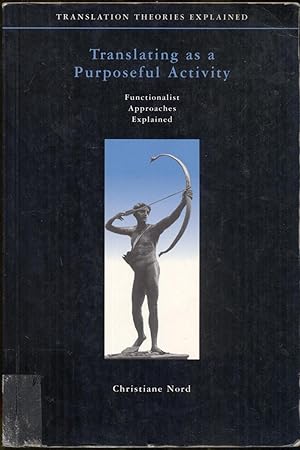German-language approaches to translation have been revolutionized by the theory of action (Handlungstheorie) and the related theory of translation's goal or purpose (Skopstheorie). Both these approaches are functionalist: they seek to liberate translators from servitude to the source text, seeing translation as a new communicative act that must be purposeful with respect to the translator's client and readership. As one of the leading figures in this field, Christiane Nord gives the first full survey of functionalist approaches in English. She explains the complexities of the theories and their terms, using simple language with numerous examples. The book includes an overview of how the theories developed, illustrations of the main ideas, and specific applications to translator training, literary translation, interpreting and ethics. The survey concludes with a concise review of the criticisms that have been made of the theories, together with perspectives for the future development of functionalist approaches.
1. Historical Overview
Early Views
Katharina Reiss and the Functional Category of
Translation Criticism
Hans J. Vermeer: Skopostheorie and Beyond
Justa Holz-Mänttäri and the Theory of Translational Action
Functionalist Methodology in Translator Training
2. Translating and the Theory of Action
Translating as a Form of Translational Interaction
Translating as Intentional Interaction
Translating as Interpersonal Interaction
Translating as a Communicative Action
Translating as Intercultural Action
Translating as a Text-Processing Action
3. Basic Concepts of Skopostheorie
Skopos, Aim, Purpose, Intention, Function and Translation Brief
Translation Brief
Intratextual and Intertextual Coherence
The Concept of Culture and Culture-Specificity
Adequacy and Equivalence
The Role of Text Classifications
4. Functionalism in Translator Training
A Translation-Oriented Model of Text Functions
A Functional Typology of Translations
Norms and Conventions in Functional Translation
Source-text Analysis, Translation Briefs and Identifying Translation Problems
A Functional Hierarchy of Translation Problems
Translation Units Revisited
Translation Errors and Translation Evaluation
5. Functionalism in Literary Translation
Actional Aspects of Literary Communication
Literary Communication across Culture Barriers
Skopos and Assignment in Literary Translation
Some examples
6. Functionalist Approaches to Interpreting
The Role of Interpreting in Skopostheorie
Translator Training: From Interpreting to Translation
A Functionalist Approach to Simultaneous Interpreting
7. Criticisms
8. Function plus Loyalty
9. Future Perspectives
![]()
